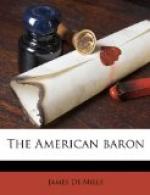“She does.”
“Then why in thunder don’t she come down?” cried the Baron, wonderingly.
“Because she is indisposed.”
“Indisposed?”
“Yes.”
This was the information which Mrs. Willoughby had decided to give to the Baron. Minnie had stipulated that his feelings should not be hurt; and this seemed to her to be the easiest mode of dealing with him.
“Indisposed!” cried the Baron.
“Yes.”
“Oh dear! Oh, I hope, ma’am—I do hope, ma’am, that she ain’t very bad. Is it any thing serious—or what?”
“Not very serious; she has to keep her room, though.”
“She ain’t sick abed, I hope?”
“Oh no—not so bad as that!”
“Oh dear! it’s all me, I know. I’m to blame. She made this journey—the poor little pet!—just to see me; and the fatigue and the excitement have all been too much. Oh, I might have known it! Oh, I remember now how pale she looked yesterday! Oh dear! what’ll I do if any thing happens to her? Oh, do tell me—is she better?—did she pass a good night?—does she suffer any pain?—can I do any thing for her?—will you take a little message from me to her?”
“She is quite easy now, thanks,” said Mrs. Willoughby; “but we have to keep her perfectly quiet; the slightest excitement may be dangerous.”
Meanwhile the Reverend Saul had become wearied with sitting dumb, and began to look around for some suitable means of taking part in the conversation. As the Baron had introduced him to society, he felt that it was his duty to take some part so as to assert himself both as a man, a scholar, and a clergyman. So, as he found the Baron was monopolizing Mrs. Willoughby, he gradually edged over till he came within ear-shot of Lady Dalrymple, and then began to work his way toward a conversation.
“This, ma’am,” he began, “is truly an interesting spot.”
Lady Dalrymple bowed.
“Yes, ma’am. I’ve been for the past few days surveying the ruins of antiquity. It is truly a soul-stirring spectacle.”
“So I have heard,” remarked Lady Dalrymple. cheerfully.
“Every thing around us, ma’am,” continued the Reverend Saul, in a dismal voice, “is subject to dissolution, or is actually dissolving. How forcible air the words of the Psalmist: ’Our days air as the grass, or like the morning flower; when blasting winds sweep o’er the vale, they wither in an hour.’ Yes, ma’am, I have this week stood in the Roman Forum. The Coliseum, also, ma’am, is a wonderful place. It was built by the Flavian emperors, and when completed could hold eighty thousand spectators seated, with about twenty thousand standing. In hot weather these spectators were protected from the rays of the sun by means of awnings. It is a mighty fabric, ma’am!”
“I should think so,” said Lady Dalrymple.
“The arch of Titus, ma’am, is a fine ruin. It was originally built by the emperor of that name to commemorate the conquest of Jerusalem. The arch of Septimius Severus was built by the Emperor of that name, and the arch of Constantino was built by the emperor of that name. They are all very remarkable structures.”




